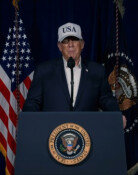New generation poses threat to ‘Chinese Dream’
New generation poses threat to ‘Chinese Dream’
Posted January. 20, 2020 08:06,
Updated January. 20, 2020 08:06
This reporter visited Taipei last December to cover the presidential election in Taiwan. Young Taiwanese in their 20s described themselves “Born independent.” It means they were raised believing Taiwan is an independent country. “This is why we cannot accept China’s one country, two systems,” said a Taiwanese university student.
Taiwanese who are in their 20s and 30s see themselves as Taiwanese, not Chinese. Their votes were what secured the second term of Taiwanese President Tsai Ing-wen who opposes closer ties with China. What has given them strong Taiwanese identity was the country’s democratization.
Despite the democratic movement in the 1980s, Taiwan remained an authoritarian society with the Kuomintang party, which mostly consisted of Mainlanders, in power until 1996 when the first direct presidential election was held. Many from older generations, who were born before the 1970s, support unification with China whereas young Taiwanese who were born in a democratic society has strong Taiwanese identity. The young Taiwanese are neither confused on their identity nor torn between unification and independence unlike older generations over 40. “Young people used to be only interested in personal issues such as finding a job,” said pundits in Taiwan. “The high turnout of young voters in the latest election, however, shows that they are determined not to leave their future in the hands of older generations.”
Following the landslide victory in the presidential election, Taiwanese newspapers reported that the younger generation is evolving from “born independent” into “born Taiwanese.” From their point of view, Taiwan is already an independent country, and there is no need to pursue independence. They want to maintain the status quo, which is the opposite of what Chinese President Xi Jinping wants.
Last year, Hong Kong also witnessed the rise of the millennial generation in protests. A student at the Chinese University of Hong Kong said, “Born in the 1990s when Hong Kong was handed over to China, we are the first generation that belongs to Hong Kong 100 percent,” meaning they were Hong Kongers, not Chinese, who were educated in a free society with its own system independent of China.”
China aims to become a world power by 2049, which marks the 100th anniversary of its founding, and the success of “one country, two systems” is also part of the plan. Its aim is to unite with Taiwan based on the “one country and two systems” principal in Hong Kong and Macao. However, armed with new values, Taiwan’s “born independent” and Hong Kong’s Millennials are posing a threat to China’s plan. It is clear that this anti-Chinese sentiment is not a passing trend, which will only grow over time.
Experts point out that, both in Taiwan and Hong Kong, China failed to recognize the rise of a new generation and took a hardline stance dismissing them as yet another group of protesters, which backfired. This is a reminder that a crisis will ensue if politicians fail to read changing demands of the public.
Wan-Jun Yun zeitung@donga.com



![[단독]폴란드, 韓 해군 최초 잠수함 ‘장보고함’ 무상 양도 안받기로](https://dimg.donga.com/c/138/175/90/1/wps/NEWS/IMAGE/2026/02/27/133437397.1.jpg)


![“‘표심’ 따라 이란 친 트럼프…지독하게 변덕스럽지만 치밀해” [트럼피디아] 〈60〉](https://dimg.donga.com/c/138/175/90/1/wps/NEWS/IMAGE/2026/03/01/133441726.1.jpg)
